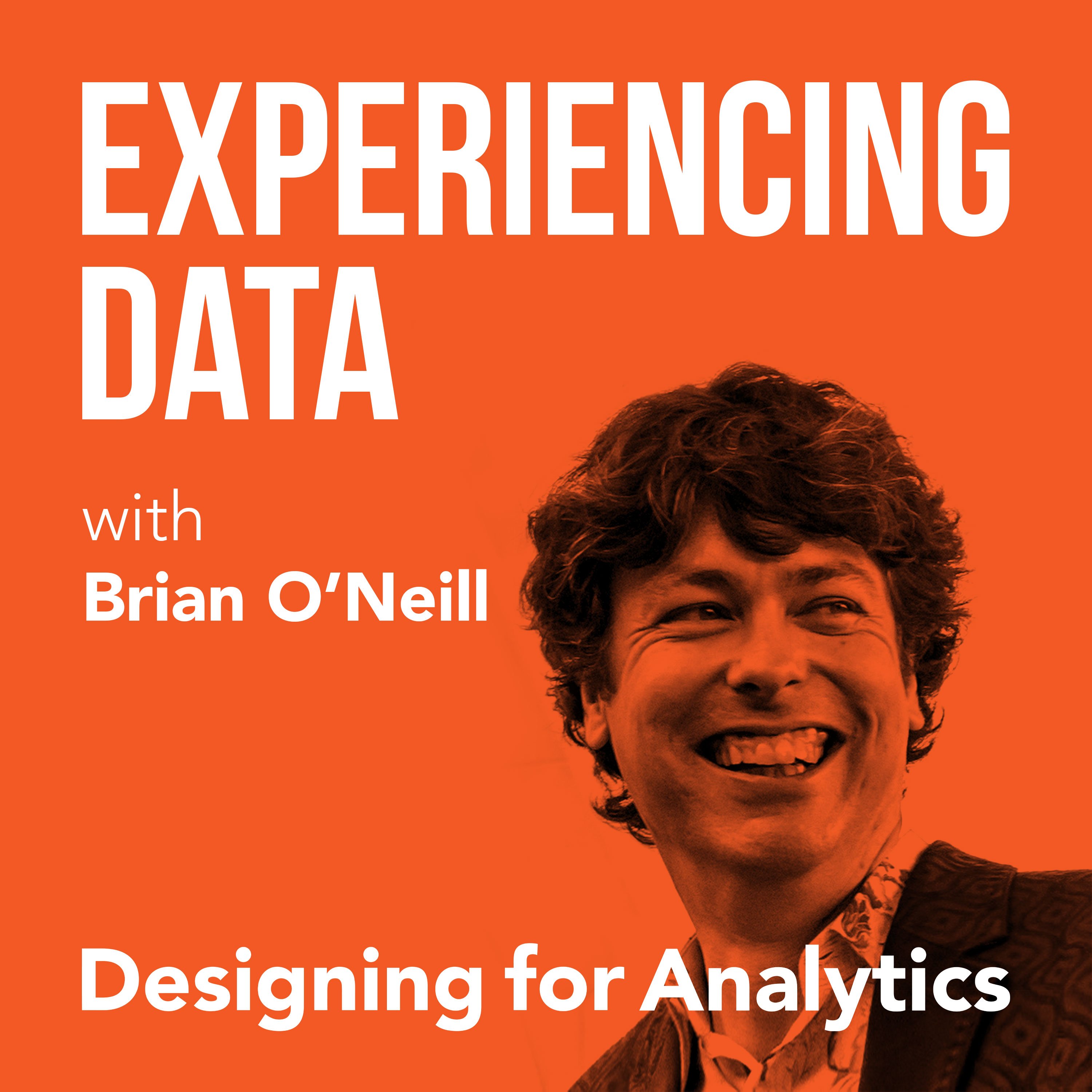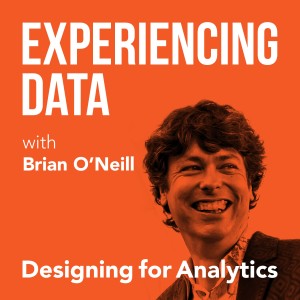

155K
Downloads
185
Episodes
Is the value of your enterprise analytics SAAS or AI product not obvious through it’s UI/UX? Got the data and ML models right...but user adoption of your dashboards and UI isn’t what you hoped it would be?
While it is easier than ever to create AI and analytics solutions from a technology perspective, do you find as a founder or product leader that getting users to use and buyers to buy seems harder than it should be?
If you lead an internal enterprise data team, have you heard that a ”data product” approach can help—but you’re concerned it’s all hype?
My name is Brian T. O’Neill, and on Experiencing Data—one of the top 2% of podcasts in the world—I share the stories of leaders who are leveraging product and UX design to make SAAS analytics, AI applications, and internal data products indispensable to their customers. After all, you can’t create business value with data if the humans in the loop can’t or won’t use your solutions.
Every 2 weeks, I release interviews with experts and impressive people I’ve met who are doing interesting work at the intersection of enterprise software product management, UX design, AI and analytics—work that you need to hear about and from whom I hope you can borrow strategies.
I also occasionally record solo episodes on applying UI/UX design strategies to data products—so you and your team can unlock financial value by making your users’ and customers’ lives better.
Hashtag: #ExperiencingData.
JOIN MY INSIGHTS LIST FOR 1-PAGE EPISODE SUMMARIES, TRANSCRIPTS, AND FREE UX STRATEGY TIPS
https://designingforanalytics.com/ed
ABOUT THE HOST, BRIAN T. O’NEILL:
https://designingforanalytics.com/bio/
Episodes

Tuesday Dec 27, 2022
Tuesday Dec 27, 2022
Today I’m chatting with returning guest Tom Davenport, who is a Distinguished Professor at Babson College, a Visiting Professor at Oxford, a Research Fellow at MIT, and a Senior Advisor to Deloitte’s AI practice. He is also the author of three new books (!) on AI and in this episode, we’re discussing the role of product orientation in enterprise data science teams, the skills required, what he’s seeing in the wild in terms of teams adopting this approach, and the value it can create. Back in episode 26, Tom was a guest on my show and he gave the data science/analytics industry an approximate “2 out of 10” rating in terms of its ability to generate value with data. So, naturally, I asked him for an update on that rating, and he kindly obliged. How are you all doing? Listen in to find out!
Highlights / Skip to:
- Tom provides an updated rating (between 1-10) as to how well he thinks data science and analytics teams are doing these days at creating economic value (00:44)
- Why Tom believes that “motivation is not enough for data science work” (03:06)
- Tom provides his definition of what data products are and some opinions on other industry definitions (04:22)
- How Tom views the rise of taking a product approach to data roles and why data products must be tied to value (07:55)
- Tom explains why he feels top down executive support is needed to drive a product orientation (11:51)
- Brian and Tom discuss how they feel companies should prioritize true data products versus more informal AI efforts (16:26)
- The trends Tom sees in the companies and teams that are implementing a data product orientation (19:18)
- Brian and Tom discuss the models they typically see for data teams and their key components (23:18)
- Tom explains the value and necessity of data product management (34:49)
- Tom describes his three new books (39:00)
Quotes from Today’s Episode
- “Data science in general, I think has been focused heavily on motivation to fit lines and curves to data points, and that particular motivation certainly isn’t enough in that even if you create a good model that fits the data, it doesn’t mean at all that is going to produce any economic value.” – Tom Davenport (03:05)
- “If data scientists don’t worry about deployment, then they’re not going to be in their jobs for terribly long because they’re not providing any value to their organizations.” – Tom Davenport (13:25)
- “Product also means you got to market this thing if it’s going to be successful. You just can’t assume because it’s a brilliant algorithm with capturing a lot of area under the curve that it’s somehow going to be great for your company.” – Tom Davenport (19:04)
- “[PM is] a hard thing, even for people in non-technical roles, because product management has always been a sort of ‘minister without portfolio’ sort of job, and you know, influence without formal authority, where you are responsible for a lot of things happening, but the people don’t report to you, generally.” – Tom Davenport (22:03)
- “This collaboration between a human being making a decision and an AI system that might in some cases come up with a different decision but can’t explain itself, that’s a really tough thing to do [well].” – Tom Davenport (28:04)
- “This idea that we’re going to use externally-sourced systems for ML is not likely to succeed in many cases because, you know, those vendors didn’t work closely with everybody in your organization” – Tom Davenport (30:21)
- “I think it’s unlikely that [organizational gaps] are going to be successfully addressed by merging everybody together in one organization. I think that’s what product managers do is they try to address those gaps in the organization and develop a process that makes coordination at least possible, if not true, all the time.” – Tom Davenport (36:49)
Links
- Tom’s LinkedIn: https://www.linkedin.com/in/davenporttom/
- Tom’s Twitter: https://twitter.com/tdav
- All-in On AI by Thomas Davenport & Nitin Mittal, 2023
- Working With AI by Thomas Davenport & Stephen Miller, 2022
- Advanced Introduction to AI in Healthcare by Thomas Davenport, John Glaser, & Elizabeth Gardner, 2022
- Competing On Analytics by Thomas Davenport & Jeanne G. Harris, 2007
No comments yet. Be the first to say something!